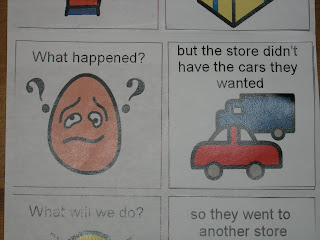About this blog.
Friday, November 27, 2009
Tuesday, November 17, 2009
Life is a Highway: Part I
"[I]t is remarkable that an intervention that is easily defined and implemented can have important lasting benefits at least to the end of middle school for all students."
To what is the quote referring? Floortime? Occupational therapy? Behaviorial therapy? Diet? A supplement?
Answer: None of the above.
The excerpt is referring to an intervention that is elegant in its simplicity: classroom size. Science Daily reports:
Small classes in early grades improve test scores in later grades for students of all achievement levels, but low achievers get an extra boost. That's the finding of a study on the long-term effects of class size in the November issue of the American Journal of Education.The study followed 11,000 students and found that:
...small classes—13 to 17 students—are most effective when they are consistent from kindergarten through third grade. Students in consistently small early classes had substantially higher test scores in grades four through eight than students who had been in larger classes. Students at all achievement levels benefited, but low achievers showed stronger benefits in reading and science.Which is interesting because at least one noted blogger has hypothesized that "sensory processing disorders are probably among the most common reasons children underachieve in school."
Which is also interesting because my school district is amidst a budget crisis and a school crowding problem. The town I live in is having an override vote in December to fund some needed school repairs. If it doesn't pass, the children from the sick building may be forced to fan out into the already crowded grammar schools.
While I can't control how my town spends its money, I can control how I spend mine. Which is to say, I can send Brad to private school, if he can get over the admissions hump and can function without an aid.
I may look back at this very idea as crazy talk, but for now, it's something I'm at the very least considering down the road. Not for preschool, but for K-5 or K-8, when classroom size makes a preciptious jump in the public school setting. Private school offers small classroom size and appreciation of individual learning styles, and some "typical" private schools offer special ed-type services, including services for language and social pragmatics.
That having been said, my husband and I are both public school graduates and believers in the public school system. For most.
Monday, November 16, 2009
Life is a Highway: Part II

Public school is a freeway, heavily trafficked and, at times, congested. There are several lanes, each with posted speeds. Drive too fast or too slow, and you're violating the law, which is strictly enforced by the police. The good news is that if you run out of gas or need help, highway patrol is there to assist. And if you need to drive in the slow lane, that option is available too. If you are at least a moderately fast car, the freeway is the best way to get to your destination.
Private school is a quiet country road. You can drive at your own pace; there is no minimum speed. You can drive fast on some stretches of the road, and slow on others. And when you drive slow on the country road, they don't call it "the slow lane." The problem is, if you need help or break down, you're on your own. There's no highway patrol, no one to assist. And on certain country roads, they won't even let you on the on-ramp unless your driving proficiency is at a minimum.
Homeschool is a parking lot. You can learn to drive expertly there, with zero risk of danger and no pressure to drive fast or slow. But you don't get to take in much by way of scenery, and you don't learn how to navigate when there are other cars on the road.
Thursday, November 12, 2009
Syllogism-ism: Part I
So I was reactionary. That's my M.O. when some one tells me something I don't want to hear. But to give me credit, over time, I was able to be objective about the evaluation and appreciate what she was trying to tell me; my reactionary phase was short-lived. Herein lies what separates a denialist from a realist.
She also told me something I hadn't previously considered: he's impaired in verbal reasoning.
"What???" I asked. No, Brad has a communication impairment but his ability to reason is perfectly in tact, I thought. Reasoning and language are totally separate areas of the brain. I read that somewhere. He has a language impairment. And a sensory issue. And a social issue. And poor working memory. But reasoning is intact. It's that simple, I reassured myself.
I hate it when I'm wrong.
After originally dismissing the SLP, I have come to believe that she is correct: Brad does have an impairment in verbal reasoning. What that means (disorder versus delay) and how it will play out, I'm not sure. But that he has an impairment is pretty obvious now that it's been brought to my attention.
Syllogism-ism: Part II
To "treat" his impairment in verbal reasoning, Brad's private speech language pathologist engages Brad using printouts like the one pictured above.
It starts with W questions, who, where and what.
Then it moves to "what happened".
And then what I call the syllogism prompt: "what will we do?"
Every week, they work on a new "story" that follows this basic interactive format. The column on the left (the W questions and the syllogism prompt) does not change. The SLP leaves me a printout so I can reinforce and practice in between sessions.
Goals, by their nature, should be something to strive for, not something already mastered, and that's why I really like this intervention. Currently, Brad doesn't really get it. He can't deduce, or problem solve yet. That last "what will we do?" question consistently trips him up. But he even though he can't formulate deductive reasoning, I think he is starting to comprehend these little syllogisms, perhaps in a passive way. But comprehension isn't for nothing. Little by little, I like to think that this type of intervention does exercise those tenuous "higher order" synapses, perhaps keeping them from dying off or causing them to flourish.
I will close with a proof point: I set the table the other day and forgot to set cups with the kids' drinks. Brad: "Mommy, you made a mistake!" (Ha! And it won't be the first, Brad.) Now that's deductive reasoning.
Added: The printouts pictured above were created with BoardMaker.
Friday, November 6, 2009
"Pruning"

When it comes to interventions, much is written about "rewiring" the brain - the theory (and, for some, hope) that intensive interventions can cause an atypical child to be more neurologically typical. Is rewiring possible? I don't think anyone knows for certain.
But it is well settled that you can work with the wires you already have. During childhood, the brain undergoes a pruning process, during which underused neurons and synapses simply die off. This is perhaps the best argument for early diagnosis and early intervention. With early intervention, perhaps we can prevent some of those tenuous synapses from dying off, and the sooner we start, the better the chance for a positive outcome.
With that in mind, in the coming weeks, I will blog about interventions that we have tried. In the upper right, I indicate that we use "moderate interventions." I'm going to try to give that vague statement a little more shape, speaking of course from a parenting/anecdotal POV.
First, a prefatory note about goals. Because, of course, as any special needs mom or dad with an IEP knows, you need to start with goals. About one year and nine months ago, if you had asked me about my goals for Brad, I might have replied that there is only one and that it is that he acquire speech. Flash forward about six months later, I started thinking more about social pragmatics and empathy. I added warmth and humor to the list of goals for Brad. Today, on a high level, my goals for Brad have shifted to intellectual capacity, i.e. making those higher order connections and doing whatever we can today to avoid intellectual disability down the road. Not that communication and warmth and humor aren't goals for Brad - they most certainly are. But I no longer fear that Brad won't acquire speech or develop empathy.




